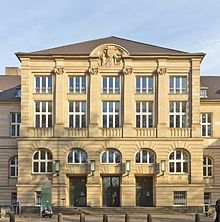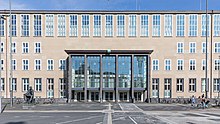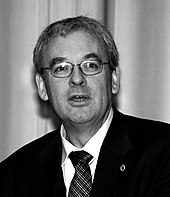The University of Cologne (German: Universität zu Köln) is a university in Cologne, Germany. It was established in the year 1388, the sixth university to be established in Central Europe.[2] It closed in 1798 before being re-established in 1919. It is now one of the largest universities in Germany with more than 50,000 students.[1] The University of Cologne is a member of the German U15 association of major research-intensive universities and was a university of excellence as part of the German Universities Excellence Initiative from 2012 to 2019. It is constantly ranked among top 20 German universities in the world rankings.
University of Cologne has 4 Clusters of Excellence; CECAD Cluster of Excellence for Aging Research, Cluster of Excellence ECONtribute: Markets & Public Policy, CEPLAS Cluster of Excellence for Plant Sciences and Cluster of Excellence Matter and Light for Quantum Information (ML4Q). As of 2022, among its notable alumni, faculty and researchers are 4 Nobel Laureates, 11 Gottfried Wilhelm Leibniz Prize winners, 7 Humboldt Professorship winners, 2 Humboldt Research Awards winners and 1 Rhodes Scholar.
History[edit]

1388–1798[edit]
The university of Cologne was established in 1388 as the fourth university in the Holy Roman Empire, after the Charles University of Prague (1348), the University of Vienna (1365) and the Ruprecht Karl University of Heidelberg (1386). The charter was signed by Pope Urban VI. The university began teaching on 6 January 1389, and operated for several hundred years.
In 1798, the university was abolished by the French First Republic, who had invaded Cologne in 1794, because under the new French constitution, many universities were abolished all over France. The last rector Ferdinand Franz Wallraf was able to preserve the university's Great Seal, now once more in use.
1919–today[edit]

In 1919, the Prussian government endorsed a decision by the Cologne City Council to re-establish the university. This was considered to be a replacement for the loss of the University of Strasbourg on the west bank of the Rhine, which contemporaneously reverted to France with the rest of Alsace. On 29 May 1919, the Cologne Mayor Konrad Adenauer signed the charter of the modern university.
At that point, the new university was located in Neustadt-Süd, but relocated to its current campus in Lindenthal on 2 November 1934. The old premises are now being used for the Cologne University of Applied Sciences.
Initially, the university was composed of the Faculty of Business, Economics and Social Sciences (successor to the Institutes of Commerce and of Communal and Social Administration) and the Faculty of Medicine (successor to the Academy of Medicine). In 1920, the Faculty of Law and the Faculty of Arts were added, from which latter the School of Mathematics and Natural Sciences was split off in 1955 to form a separate Faculty. In 1980, the two Cologne departments of the Rhineland School of Education were attached to the university as the Faculties of Education and of Special Education. In 1988, the university became a founding member of the Community of European Management Schools and International Companies (CEMS), today's Global Alliance in Management Education.
The university is a leader in the area of economics and is regularly placed in top positions for law and business, both for national and international rankings.
Organization[edit]

The University of Cologne is a statutory corporation (Körperschaft des öffentlichen Rechts), operated by the Federal State of North Rhine-Westphalia.
Faculties[edit]
The university is divided into six faculties, which together offer 200 fields of study. The faculties are those of Management, Economics and Social Sciences, Law, Medicine (with the affiliated University clinic), Arts, Mathematics and Natural Sciences and Human Sciences.
| Faculty | Students |
|---|---|
| c. 10,000 | |
| c. 5,000 | |
| c. 3,200 | |
| c. 16,500 | |
| c. 7,500 | |
| Faculty of Human Sciences | c. 2,800 |
Rectors[edit]

On 24 November 2004, the physicist Axel Freimuth was elected as Rector of the University. His (initially four-year) term began on 1 April 2005. He succeeded Tassilo Küpper and was the 49th Rector since 1919. He was previously Dean of Mathematics and Natural Sciences.



